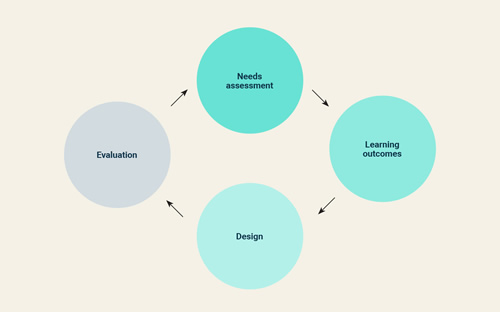RACGP CPD Activity Standards
The RACGP CPD Activity Standards (Activity Standards) inform the development of CPD activities for the RACGP CPD home under the MBA’s Professional Performance Framework (PPF). For more information visit www.medicalboard.gov.au/Professional-Performance-Framework.aspx Activity Standards for assessing CPD activities have been developed using evidence-based best practice education. Activity Standards represent key components of high-quality educational design, implementation and evaluation.
These standards can be used by individuals and organisations developing CPD activities to meet the RACGP CPD activity requirements. They also form the basis for adjudication of CPD activities by the RACGP CPD home.
It’s important that relevant documentation for development of CPD activities is retained for three years after the end of each one-year cycle as per the MBA CPD Registration Standards for evidence of quality improvement and audit purposes.
The provider must maintain at least one key person to manage administration, operations and interactions with the RACGP. The nominated person will be required to undertake CPD Representative training.
CPD Providers will also need to meet the RACGP CPD Provider Standards.
Characteristics of CPD activity types
The MBA defines CPD activity types as educational activities (knowledge and skills), reviewing performance and measuring outcomes. RACGP CPD activities use the same categorisation (Table 3).
Table 3. MBA CPD activity types explained
Educational activities (knowledge and skills)
|
Activities that expand general practice knowledge, skills and attitudes, related to a GP’s scope of practice. These activities will be very familiar to GPs and include learning opportunities like lectures, webinars, workshops, reading, podcasts and courses. |
| Reviewing performance |
Activities that require reflection on feedback about a GP’s work. Feedback might be from patients, peers or even from themselves. In each of these situations, they’ll receive information about their performance that can either validate what they already do or identify areas for improvement. Meaningful reflection on this information is where the learning occurs and can result in improved capability in their scope of practice. |
| Measuring outcomes |
Activities that use a GP’s work data to ensure quality results. When measuring outcomes, they’ll use data from their work to show they are aware of current evidence and best practice in a particular area. GPs can achieve this by conducting activities like research, audits or evaluations. This type of learning can help GPs achieve high-quality performance in their scope of practice. |
To explore a comprehensive list of activities and their activity type, visit www.racgp.org.au/education/professional-development/cpd/2023-triennium
CPD program-level requirements
The following are the CPD program-level requirements:
Culturally safe practice - www.amc.org.au/accreditation-and-recognition/accreditation-standards-and-procedures/
The National Scheme’s Aboriginal and Torres Strait Islander Health and Cultural Safety Strategy 2020- 2025 provides the following definition: ‘Cultural safety is determined by Aboriginal and Torres Strait Islander individuals, families and communities. Culturally safe practice is the ongoing critical reflection of health practitioner knowledge, skills, attitudes, practising behaviours and power differentials in delivering safe, accessible and responsive healthcare free of racism.’ Consistent with the Strategy 2020-2025, it is expected that CPD activities allow critical reflection to improve clinical practice in relation to:
- Aboriginal and Torres Strait Islander approaches to health
- the continuing impact of colonisation, racism and bias on health outcomes on Aboriginal and Torres Strait Islander peoples
- rights-based approaches to improving health outcomes of and access to health services.
Health inequities - www.amc.org.au/accreditation-and-recognition/accreditation-standards-and-procedures/
Different access and outcomes for different groups of people may present differently depending on the specialty and location of a practitioner’s practice. Good medical practice recognises the role of the practitioner as a champion in the system and also the specialty responsibilities in securing equitable health experiences and outcomes for Aboriginal and Torres Strait Islander patients.
Professionalism and ethical practice - www.racgp.org.au/education/education-providers/curriculum/curriculum-and-syllabus/home
A GP’s social contract with the community, which involves trust between the GP and the patient, observing patient-doctor boundaries, commitment to scientific and clinical excellence, promotion of health and interests of patients before other interests.
The AMC requires CPD homes to provide advice and guidance to medical practitioners on how to meet them. As an example, CPD activities provided by an Aboriginal and/or Torres Strait Islander health professional organisations and/or organisations with appropriate expertise in Indigenous health will be recognised as meeting the culturally safe practice requirement.
The CPD Activity Standards
There are four CPD Activity Standards (Figure 2) representing key components of high-quality educational design, implementation and evaluation.

Figure 2. Four CPD Activity Standards
When developing CPD approved activities, providers are encouraged to use the criteria outlined in the CPD Activity Standards to innovate and create high-quality education that meets the current and emerging needs of GPs.
Mandatory requirements for all activities
When developing and delivering RACGP CPD approved activities, requirements include:
- a GP on the planning committee
- alignment with the 2022 RACGP Curriculum and syllabus for Australian general practice
- a needs assessment (Appendix 3)
- learning outcomes (Appendix 4)
- a CPD activity session plan relevant to the application
- an evaluation form (Appendix 7)
- a record of attendance
- a statement of attendance or completion (Appendix 8).
If the activity submitted does not comply with the CPD Activity Standards, the RACGP CPD Program Coordinator may request further information. Failure to meet the CPD Activity Standards on the second submission will mean the activity is not approved.